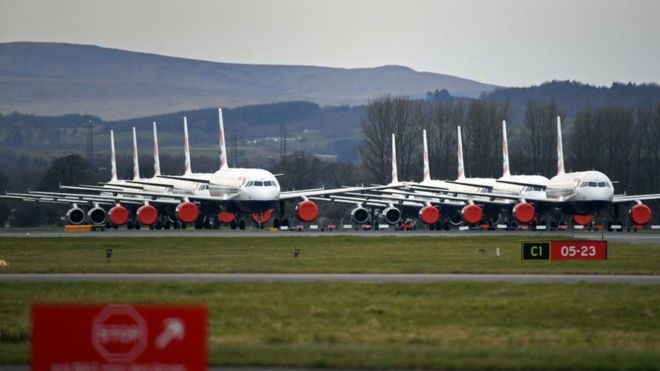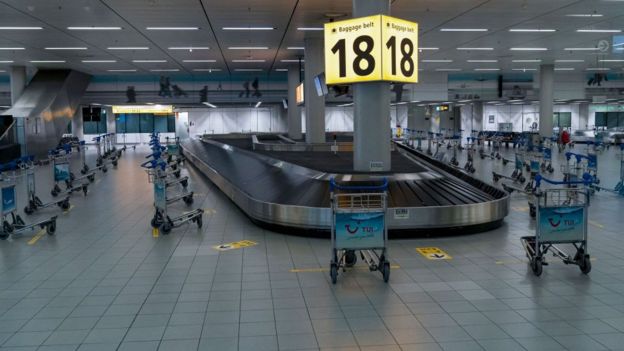
Aviation is the most global of global industries. It employs millions of people, underpins the livelihoods of tens of millions more, and acts as part of the central nervous system of international business and leisure.
Yet now vast parts of the network have been shut down. The number of daily flights has fallen by 80% since the start of the year, and in some regions nearly all passenger traffic has been suspended.
The industry is in survival mode, with airlines, airports and ground-handling firms all desperate to conserve their cash reserves, while their normal revenue streams have dried up.
Widespread job losses are now expected, with British Airways' parent company IAG announcing on Tuesday that it is set to cut up to 12,000 positions from the airline's 42,000-strong workforce. IAG said it did not expect BA to see passenger demand return to 2019 levels for "several years".
Elsewhere, Easyjet has laid off its 4,000 UK-based cabin crew for two months, Qantas has put 20,000 staff on leave, and 700 pilots at American Airlines have agreed to take early retirement.
Even so, attention is now gradually turning to the future, and how airlines around the world can hope to slowly return to something approaching normality.
 Getty Images
Getty Images
There are obvious logistical challenges. Aircraft need to be prepared for flight, and airports made ready to receive them. Schedules need to be drawn up, and staff made available.
But there are also less predictable issues to contend with. No-one can be quite sure yet where aircraft will be allowed to fly to, or what conditions might be imposed on staff and passengers by national authorities.
There are currently around 17,000 aircraft parked up at airports around the world, according to consultants Ascend by Cirium. That represents about two-thirds of the global fleet.
BA, for example, has aeroplanes stored at London Heathrow, at its maintenance base in Cardiff, on taxiways at regional airports such as Bournemouth, and at Chateauroux airport in France.
Even while parked, these aircraft require regular maintenance. Some will have been kept ready for immediate use. Many airlines have been carrying out repatriation flights, for example, or ad-hoc cargo services. But others will take a week or longer to prepare for flight, according to people within the industry.
If all those aircraft were needed at once, getting them ready would be a formidable challenge. However, analysts say in practice this is unlikely to be the case - because most airlines will start off by operating relatively limited schedules, and many aircraft will not actually be needed for months to come.
A further significant issue is the raft of human qualifications needed to allow the industry to function.
Pilots, for example, need time in the air, or in the simulator, to maintain their "ratings", or permits to fly specific aircraft. They also need regular medical checks. Other critical staff, such as air traffic control personnel and engineers, have time-limited qualifications as well.
Post a Comment
If you have any doubt please let m know.